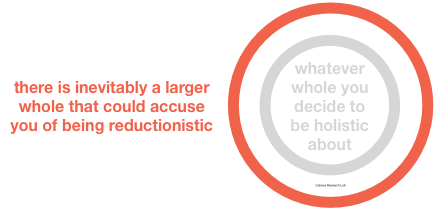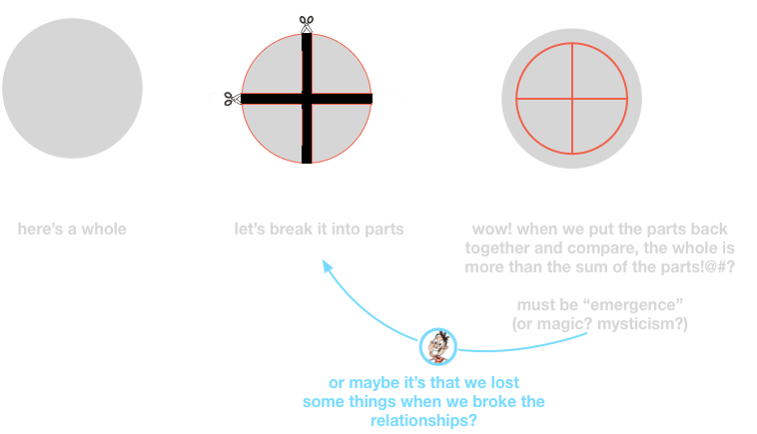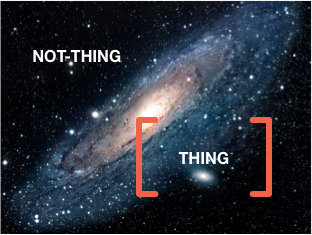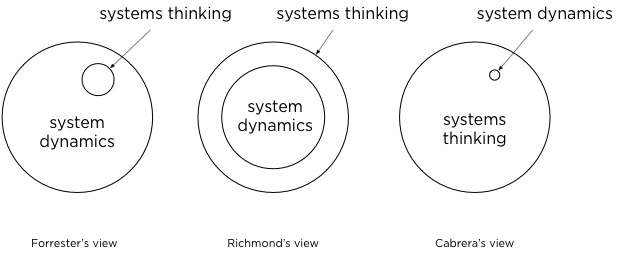Systems thinking is not the same as holistic thinking
Let’s deconstruct this often made claim that systems thinking (ST) stands in contrast to (in this case on opposite ends of a continuum from) reductionism. This claim appears reasonable at first, and it is one made my many of the founding fathers of systems thinking as well as contemporary systems thinkers. But there are some dangers, mostly having to do with misleading people new to the field toward misunderstanding what it means to be a systems thinker.
First, if reductionism (breaking things down into their constituent parts) is on one side of a continuum, then holism (seeing things in the context of their whole) is on the other. If reductionism is the opposite of ST, then ST and holism are synonymous. Here lies the problem…
No matter how holistic one gets, there is always a larger whole to act as context, and one is therefore always surgically removing the whole under consideration from the whole it is a part of, which is one of the chief criticisms with reductionism. So being a pure holist who does not reduce or being a pure reductionist who is not holistic is absurd and it is a false dichotomy. We need to do both just to begin thinking about anything.
Therefore, to break things down into parts (reductionism) is an act of systems thinking as much as seeing things in the context of their whole. A healthy part-whole balance is a necessary aspect of systems thinking. There’s an old saying that there are two kinds of scientists: splitters and lumpers. Systems thinking then is the act of not accepting this duality and of being a "splumper."
Of course, this creates another problem. When we “break” things down into their structural parts, we are “breaking” the dynamical relationships, so we must therefore take extra caution to identify the broken relationships and think of them as the dynamical parts of the whole (or we may end up with unexplainable phenomena that we must label emergence).
Of course, now we have another problem: that even our most holistic thinking cannot be infinite and complete. Even holistic thinking must draw a boundary somewhere. At the very least between what we consider and what we do not. At that moment a distinction forms between what we decided to consider and what we decided not to consider. This boundary is a distinction where we identify some thing(s) as being inside the scope of our observation and some other things as being outside the scope.
This in turn causes yet another problem which is that the choice of a boundary is a subjective one, requiring perspective, so we must consider that these distinctions we make for the whole (and each subsequent distinction we make of the parts) is perspectival. Change our perspective and the distinctions we make change, too.
And this makes us realize why we must challenge the "parts are more than the whole" trope (W=P versus W<P) because these concepts become interconnected.
Because, even if you only wanted to understand the whole (holism), you would be forced to also understand the parts. Because the parts (which include the relationships) is where the whole is born.
The repudiation of reductionism was popularized in the ST space (historically speaking) by Bertalanffy. And, he was somewhat "right" (or at least it was necessary) in focusing on holism over reductionism. The reason he did was because he was fighting a scientific establishment that was woefully imbalanced toward reductionism. Ergo, he emphasized holism. Unfortunately, this emphasis has taken hold and become a trope. A holistic emphasis was never the intended long-term goal, it was a short-term strategy to fight reductionism ad absurdum (which is not the same as reductionism). The long term goal is a necessary balance. The argument between holism and reductionism is akin to the debate between nature and nurture. They are both so integrally intertwined that speaking about one without considering the other is hard to do.
One need only to look at the great discoveries that we would consider "systemic in nature" to see that the scientific process that those discoveries took required a balance of reductionism and holism (focus on the parts and the whole and deep relationships between them).
The view that ST is the same as holism (ST=H) is certainly more popular (or populist) than my view that ST requires equal potions of holism and reductionism, (ST=R/H=1/1=1), but I think that one has a few ways of determining the validity. First, we can use logic. Second we can use empiricism. In both cases, I think it is pretty clear that the answer is AND/BOTH (or alternatively, ST=R/H (where, R=reductionism; H=holism)).
There are numerous reasons why logic tells us this is the case. First, is the issue of the opposite of reductio ad absurdum (absurd reductionism) which is holio ad absurdum (absurd holism). The argument against absurd-holism goes like this: if ST=H then the ONLY people that are doing ST are Astronomers who study the entire universe, because every other person is focused on "just the parts." Second, is the issue of emergence and W=P. If W=P and P=P_s*P_r (where, (P_s) structural parts and (P_r) relational parts), then to understand W, we must understand its equality, P. Understanding W alone without understanding its parts (P) is akin to stating that “W=.” Well, yes, but what is W? W just is. Okay, well, what if I want to understand more about what W is? I’d need to understand P and further I’d need to understand all of it parts, including relationships.
But now let’s move away from logic and just ask ourselves empirically, what do systems thinkers do? In other words, if we see some thinking or thinker who we deem to be “systemic,” what is it that they are doing that makes it so? Is it that they are only seeing the whole (W)? If so, then we might conclude that ST=H. But one would be hard pressed to conclude such a thing. Indeed, if we were to take the heroes of Systems Thinking (Poincare, Darwin, Einstein, Goodall, Bohm, Feynman, Gell-Mann, and most recently Manabe, Hasselmann, Parisi) we wouldn’t conclude that the bulk of their work was contemplating the Whole. Indeed, Gell-Mann, founder father of the Santa Fe Institute for the Study of Complex Systems explained, speaking to an audience of
some of the great systems scientists, states55:
We all know that in most situations, theory has to advance along two tracks: the fundamental search for dynamical explanations on the one hand, and on the other, the phenomenological search for pattern in the laws of Nature. There are associated experimental domains in each case...There is always a reductionist bridge between these two kinds of explanation, the fundamental and the phenomenological. (I assume all of us are in principle reductionists.) But it often takes a very long time to construct such a bridge, such as the one between the brain and the mind, even though great strides are being made. While the construction is going on, it is necessary to pursue both approaches, which means in this case to study both the brain and the mind. [1,2] (p8) [emphasis added]
In the same discussion, which inaugurates the founding of the Santa Fe Institute (SFI)—a premier institute for the study of complex systems—Gell-Mann offers the following testament to both forms of thinking—reductionist and holist:
There are some psychologists and pop psychologists who like to place people on a scale running from Appolonian to Dionysian, where, roughly speaking, Appolonians tend to favor logic, rationality, and analysis, while Dionysians go in more for intuition, feeling, and synthesis. In the middle are those tortured souls, the Odysseans, who strive for the union of both styles. The new institute would have to recruit a number of Odysseans to be successful! [1,2](p8)
It is the case, that if we look empirically at what great systems thinking is and what great systems thinkers do, they do both.
One might argue that holism is not the same as a focus on the whole (W) and reductionism is not the same as a focus on the parts (P), and this is true, they are not precisely the same. Holism (H) is a trend (a probability) toward focusing on the whole (W) whereas Reductionism (R) is a trend (a probability) toward focusing on the parts (P). But one cannot have a trend without the instantiation, and in that sense, the discussion of Wholes and Parts precedes the discussion of holism and reductionism.
Finally, we return full circle to the conclusion that ST=R/H=1/1=1, which is not dissimlar but a fractal of, the larger equation for Systems Thinking itself. Cabrera writes,
Thus, the goal of systems thinking is increase the value of the fraction between our Mental models and Reality such that MR =1.This is an aspirational goal. But interestingly, it is this aspirational goal that differentiates the phenomenon of systems thinking from plain-old thinking. Because systems thinking has an expressed aspirational goal of making the fraction between mental models (M) and Reality (R) equal to 1, such that MR = 1 = 1. Thinking doesn’t have this aspirational goal, so it doesn’t require metacognition (just cognition). Otherwise, they’re exactly the same. But that’s a pretty big otherwise.
A simple way to understand this formula is to focus in on just one portion of the mental model of the parts of an ecology versus the actual parts of an ecology. Your mental fraction between mental models and reality: . We will use the Sp by asking about your Rw model might include 247 parts whereas you estimate that the actual ecology includes many ˆ pˆSwˆ 247 − M more than 247 parts (≫ 247). Thus, Swp = ≫247 = 2.47 × 10= 2.47e−M (i.e., scientific notation a very small number). If your understanding of those 2.47e−M parts is useful in whatever it is you’re trying to accomplish in the ecology, then the numerator (your mental model) suffices as a model for the denominator (reality). If it doesn’t then you might make the structural prediction that there are more/different parts that you need to understand. Regardless, the denominator is almost always effectively much greater than the numerator. Therefore, regardless of the circumstances, one is almost always hopelessly assembling the parts while asymptotically chasing the whole.
This is just one of the "Sacred Cows" of Systems Thinking. Click the link to see all all sacred cows and their scientifically valid replacements.
For a much more extensive introduction to these ideas see the new book, Systems Thinking Made Simple: New Hope for Solving Wicked Problems.
[1] Cabrera, D. (2006) Systems Thinking. Cornell University.
[2] Gell-Mann M. The Concept of the Institute. In: Pines D, ed. Emerging
syntheses in science : proceedings of the founding workshops of the Santa Fe
Institute, Santa Fe, New Mexico. Redwood City, Calif.: Addison-Wesley;
1988.
[3] Cabrera, D.; Cabrera, L.; Cabrera, E. DSRP Theory: A Primer. Preprint of Forthcoming Submitted Article. 2021
.png?width=150&height=150&name=CRL%20GOAT%20Logo%20(4).png)


